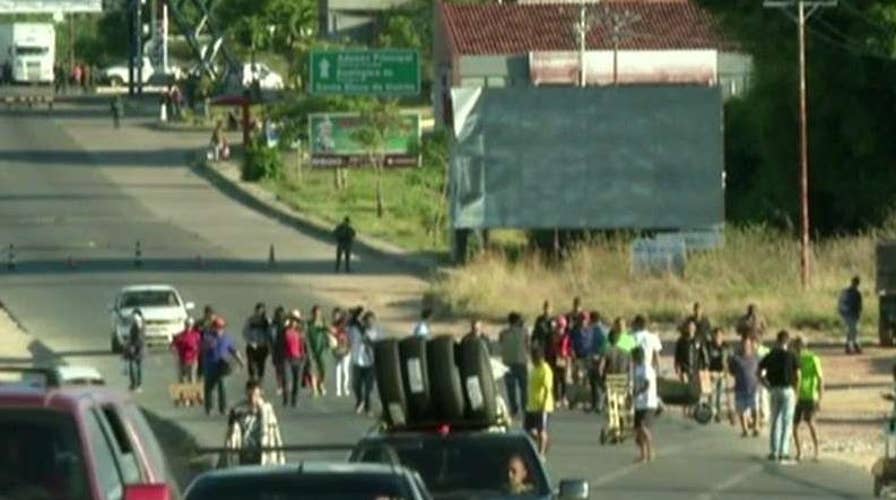Venezuela facing new unrest after Maduro closes border with Brazil
Deadly clashes are being reported at the border after President Nicolas Maduro refuses foreign humanitarian aid; Kitty Logan reports.
All eyes are on Venezuela this week, especially on Saturday, Feb. 23.
That is the date of the deadline Juan Guaidó, the young leader of the opposition, gave President Nicolas Maduro to allow humanitarian aid into the country. The Venezuelan army, still loyal to Maduro, has turned tons of food, medical supplies and other relief items away at the border, while millions of Venezuelans suffer. If Maduro doesn’t order the military to stand down, Guaidó warned he would rally crowds and bring the humanitarian aid over the border.
But as the world obsesses over the power tussle for Venezuela’s presidency, most Venezuelans are worried about something else. Their main concern is, “Will my children eat today?”
FLORIDA DEMS FUME AT BERNIE SANDERS FOR REFUSING TO CONDEMN MADURO AS DICTATOR
Venezuela — once the wealthiest country in South America — has been in economic trouble for years, leading to one of the worst food crises in the world. Some reports reveal that at least one-third of the population eats just one meal a day. The food scarcity has resulted in severe malnutrition and weight loss on a nationwide scale — last year, a study revealed that Venezuelans lost an average 24 pounds in 2017.
What is behind Venezuela’s food crisis? The short answer is another crisis: hyperinflation.
By the end of 2018, hyperinflation drove the cost of basic necessities to double every 19 days. Families have been selling everything they own just to buy a few meals.
Our partners on the ground have shared with us several stories that highlight just how dire the situation is.
One father recounted how he went to purchase one and a half kilos (about 3 pounds) of ham to feed his children. It cost him 11,000 bolívares. When he went again the next week, the price had shot up to 55,000 bolívares, a 500 percent increase in a matter of days.
In fact, the Venezuelan currency is tumbling so fast that people have begun a sort of bartering system, trading wads of bolívares for items such as sacks of sugar, which retain their value for a longer period of time. Today, you would need a backpack to carry $10, about 25,000 bolívares, according to a currency exchange website that has been tracking the value of Venezuelan money.
Mateo and Isabella’s story painfully illustrates how middle-class families in Venezuela have fallen into poverty. I have changed their names due to the dangerous climate in their country.
The couple used to have a thriving business manufacturing school uniforms. They were successful and had all of their needs met. But as the economic crisis escalated, Mateo and Isabella were forced to sell their company’s machinery … then their cars … and eventually their house, so they could eat.
It wasn’t enough.
Soon that money ran out, too, and things quickly took a turn for the worse. Mateo got sick and ended up dying shortly after because they couldn’t afford the medicine he desperately needed. Now, their 14-year-old son is on the brink of starvation.
Isabella was in tears as she told her story. And she weeps, even more, every time she looks at her son — so skinny that his bones poke through his skin. She hates that she can’t feed her family. And every day she fears that she’ll lose her son. No mother should have to worry about whether or not she’ll be able to keep her child alive.
Who will win the power tussle for Venezuela’s presidency is a question I personally cannot answer; but, I know I can at least help answer the question most parents are asking.
CLICK HERE TO GET THE FOX NEWS APP
For more than a year now, our organization, World Help, has been quietly working with partners in Venezuela to provide food and other essentials, such as hygiene kits, to families in need. I’m not understating it when I say the food we provide is literally helping save lives. But as always, humanitarian organizations such as ours need the help of supporters to keep the aid flowing.
I pray that the reappearance of Venezuela’s crisis in the news will move people to remember this isn’t simply about politics. It’s really about people, like you and me, who need our help.

